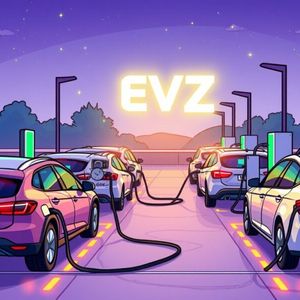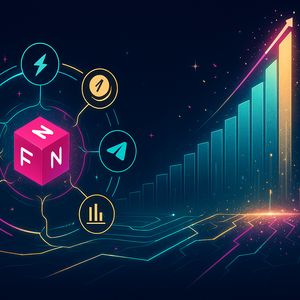

EV Charging Blockchain: Vehicle Zone (VZ) Unveils a Bold New Era for Sustainable Mobility
BitcoinWorld EV Charging Blockchain: Vehicle Zone (VZ) Unveils a Bold New Era for Sustainable Mobility The world of sustainable transportation is rapidly evolving, and at its intersection with cutting-edge technology lies the fascinating realm of the EV charging blockchain . A significant development is unfolding as EVZ, a pioneering Singapore-based platform, announces its strategic rebrand to Vehicle Zone (VZ). This transformation isn’t just a name change; it signifies a renewed commitment to revolutionizing how electric vehicles power up, paving the way for a more decentralized and efficient future. For cryptocurrency enthusiasts and eco-conscious individuals alike, understanding this pivotal shift is crucial to grasping the next wave of Web3 innovation in mobility. The Road Ahead: Why the EVZ Rebrand to Vehicle Zone (VZ) Matters EVZ, originally established as a blockchain platform dedicated to sharing electric vehicle (EV) charging infrastructure, has been at the forefront of integrating distributed ledger technology with real-world utility. Their mission was clear: to create a more accessible and efficient network for EV charging by leveraging blockchain’s inherent transparency and security. Now, with the rebrand to Vehicle Zone (VZ), the company signals a strategic evolution that extends beyond just charging. According to their official Medium blog post, the shift to Vehicle Zone (VZ) represents a broader vision for the future of mobility. While the core focus on EV charging remains paramount, the new name suggests an expansion into a more comprehensive ecosystem of vehicle-related services. This rebrand is a powerful statement about their ambition to become a central hub for various decentralized vehicle solutions, potentially encompassing everything from battery swapping and vehicle data management to peer-to-peer vehicle sharing and autonomous fleet operations. The transition to VZ is not merely cosmetic; it’s a strategic pivot designed to better reflect their expanded scope and future aspirations in the rapidly growing Web3 mobility sector. The company is set to unveil its updated logo, a redesigned homepage, and select white papers on July 31. These new assets are expected to provide deeper insights into VZ’s refined roadmap, technological advancements, and a clearer articulation of their expanded vision for the EV charging blockchain and beyond. Powering the Future: Understanding the EV Charging Blockchain Ecosystem You might be wondering, how exactly does blockchain technology enhance the seemingly straightforward process of charging an electric vehicle? The integration of blockchain into EV charging infrastructure creates a decentralized, transparent, and highly efficient network. Instead of relying on centralized operators, blockchain enables direct, secure, and verifiable transactions between EV owners and charging station providers, or even between individual peer-to-peer chargers. Here’s how the EV charging blockchain ecosystem brings about a paradigm shift: Decentralized Access: It allows anyone with a compatible charging station to offer it for use, creating a wider, more accessible network of charging points. Transparent Transactions: All charging sessions and payments are recorded on an immutable ledger, ensuring transparency and reducing disputes. Secure Payments: Smart contracts can automate payments, ensuring that funds are released only when charging conditions are met, eliminating fraud. Efficient Resource Allocation: Data on charging station availability and usage can be shared in real-time across the network, optimizing resource allocation and reducing wait times. Peer-to-Peer Charging: Imagine renting out your home charger to a neighbor while you’re at work, with payments handled seamlessly by the blockchain. This opens up new revenue streams for individuals and businesses. While the benefits are compelling, the EV charging blockchain space also faces challenges. These include ensuring scalability to handle a massive number of transactions, achieving interoperability between different hardware and software systems, and navigating evolving regulatory landscapes. However, pioneers like Vehicle Zone (VZ) are actively working to overcome these hurdles, pushing the boundaries of what’s possible in sustainable mobility. What’s New with Vehicle Zone (VZ)? Unpacking the Transformation The upcoming unveiling on July 31st is poised to be a landmark event for Vehicle Zone (VZ) and its community. The refreshed brand identity, including the new logo and homepage, will likely embody VZ’s broader aspirations and commitment to a more inclusive and expansive mobility ecosystem. A modern, intuitive homepage can significantly improve user experience, making it easier for new users to understand the platform and for existing users to navigate its features. Perhaps the most anticipated aspect of the unveiling will be the release of select updated white papers. These documents are the bedrock of any blockchain project, detailing its technical architecture, tokenomics, governance model, and future roadmap. For Vehicle Zone (VZ), these updated white papers could reveal: Enhanced Technical Architecture: Details on improvements to their blockchain protocol, potentially addressing scalability, security, or interoperability. Refined Tokenomics: Updates to their utility token’s role within the expanded VZ ecosystem, including new use cases or staking mechanisms. Expanded Service Offerings: Concrete plans for integrating services beyond just EV charging, such as vehicle-to-grid (V2G) solutions, data monetization, or decentralized fleet management. Strategic Partnerships: Announcements of collaborations with automotive manufacturers, energy providers, or smart city initiatives that could accelerate adoption. These insights will be crucial for both existing community members and potential new investors looking to understand VZ’s long-term vision and its potential impact on the EV charging blockchain and broader Web3 mobility sectors. The rebrand signifies a commitment to innovation and adaptability in a rapidly changing market. Driving Innovation: How Vehicle Zone (VZ) is Shaping Sustainable Mobility The rebrand to Vehicle Zone (VZ) positions the platform not just as a player in EV charging, but as a potential leader in the entire sustainable mobility landscape. By broadening its scope, VZ aims to tackle more complex challenges and unlock new opportunities within the smart city and green energy movements. Imagine a future where your electric vehicle is not just a mode of transport but an active participant in the energy grid, earning you rewards for contributing power back during peak demand, all managed seamlessly by a decentralized platform. VZ’s focus on a comprehensive vehicle zone implies a future where various mobility services are interconnected and optimized through blockchain. This could include: Vehicle-to-Grid (V2G) Integration: Allowing EVs to send excess power back to the grid, stabilizing energy supply and creating revenue for owners. Decentralized Data Marketplaces: Securely sharing anonymized vehicle data (e.g., traffic patterns, road conditions) for urban planning or new service development, with owners retaining control and potentially earning from their data. Autonomous Vehicle Integration: Laying the groundwork for future autonomous fleets to utilize decentralized charging and service networks. By building a robust and expansive platform, Vehicle Zone (VZ) has the potential to significantly contribute to global efforts towards reducing carbon emissions and fostering more efficient, equitable transportation systems. Their commitment to leveraging blockchain technology for real-world utility positions them as a key innovator in the intersection of Web3 and sustainable development, truly driving the evolution of the EV charging blockchain space into a holistic mobility solution. Benefits for Stakeholders: For EV Owners: Expect a more reliable, widespread, and potentially cost-effective charging experience. The promise of peer-to-peer options and potential V2G integration could also open new revenue streams. For Charging Infrastructure Providers: VZ’s platform offers a way to maximize asset utilization, streamline payments, and potentially attract a broader user base through a decentralized network. For Developers: The rebrand and updated white papers may signal new APIs, SDKs, or developer tools, fostering innovation and allowing third-party applications to build on the VZ ecosystem. For Investors: The strategic expansion into a broader mobility ecosystem positions VZ for long-term growth in a sector poised for massive expansion. The rebranding of EVZ to Vehicle Zone (VZ) is more than just a new identity; it’s a bold declaration of intent. It signifies a strategic evolution towards a more comprehensive and impactful role in the future of sustainable mobility, anchored by the power of the EV charging blockchain . As the world increasingly shifts towards electric vehicles and decentralized technologies, VZ is positioning itself to be a pivotal player in building the infrastructure for a greener, more connected future. The unveiling on July 31st will undoubtedly be a moment to watch for anyone invested in the intersection of blockchain, sustainability, and the future of transportation. Frequently Asked Questions (FAQs) Q1: What is Vehicle Zone (VZ)? A1: Vehicle Zone (VZ) is the new brand identity for EVZ, a Singapore-based blockchain platform originally focused on sharing electric vehicle (EV) charging infrastructure. The rebrand signifies an expanded vision for a broader ecosystem of decentralized vehicle-related services. Q2: Why did EVZ rebrand to VZ? A2: The rebrand to Vehicle Zone (VZ) reflects a strategic expansion of the platform’s scope beyond just EV charging. The new name aims to encompass a wider range of decentralized mobility solutions and better position the company for future growth in the Web3 mobility sector. Q3: When will the new VZ branding and updates be unveiled? A3: Vehicle Zone (VZ) is scheduled to unveil its updated logo, redesigned homepage, and select white papers on July 31st, according to their Medium blog post. Q4: How does blockchain technology improve EV charging? A4: Blockchain enhances EV charging by enabling decentralized access to charging stations, ensuring transparent and secure peer-to-peer transactions, automating payments via smart contracts, and optimizing resource allocation across the network. This creates a more efficient and user-friendly EV charging blockchain ecosystem. Q5: What potential benefits does Vehicle Zone (VZ) offer EV owners? A5: For EV owners, VZ aims to provide a more reliable and widespread charging network, potentially lower costs through peer-to-peer options, and future opportunities for vehicle-to-grid (V2G) integration, allowing them to earn by contributing power back to the grid. Q6: Is Vehicle Zone (VZ) a cryptocurrency? A6: Vehicle Zone (VZ) is a blockchain platform. Like many blockchain platforms, it likely utilizes a native utility token to facilitate transactions, incentivize participation, and govern the network within its ecosystem. Details about their tokenomics will be further clarified in their updated white papers. If you found this article insightful, consider sharing it with your network! Help us spread the word about the exciting developments in the EV charging blockchain space and the future of sustainable mobility. Your shares help us reach more enthusiasts and innovators. To learn more about the latest crypto market trends , explore our article on key developments shaping decentralized finance institutional adoption . This post EV Charging Blockchain: Vehicle Zone (VZ) Unveils a Bold New Era for Sustainable Mobility first appeared on BitcoinWorld and is written by Editorial Team














